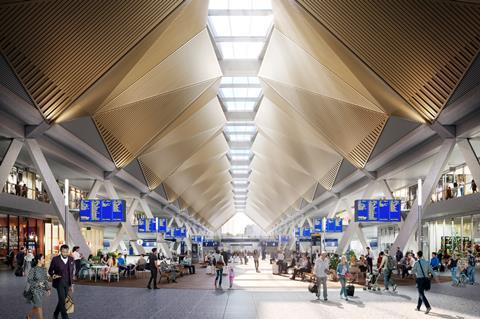Line’s first phase unlikely to meet its £40bn spending target, project team admits in latest report to parliament

HS2 has racked up more than £100m in wasted design costs on its London terminus at Euston station after downsizing the plans, the project has admitted.
Grimshaw’s designs for a scaled back 10-platform station were unveiled in March, with the railway admitting yesterday that “significant elements” of the original 11-platform design work can no longer be used.
The first phase of the line from London to Birmingham is unlikely to meet its £40.3bn target cost as it stands, with an additional £200m of its £5.6bn delegated contingency funding spent since March.
According to a six-monthly update to parliament, the Department for Transport (DfT) is now projecting around £1.9bn of cost pressures on the first phase, with additional design work on the Euston terminal and lower-than-planned productivity on main civils.
The government and HS2 confirmed last October that the number of platforms at the station would be reduced to allow construction to be done in a single phase.
While the DfT said this would “assist in addressing some of the cost pressure at Euston”, the related costs were reported as a £105.6m impairment in its most recent annual report and accounts.
> Also read: Government scraps £3bn HS2 link
> Also read: McAslan lands redesign role for New York’s Penn Station
The refreshed designs for the station were drawn up by a constorium of Arup, WSP and Grimshaw and will see the terminus set across three levels with ten 450m-long subsurface platforms which can be served by up to 17 high-speed trains an hour.
According to the DfT, the construction partner on Euston, Mace Dragados, is “continuing to optimize design and construction efficiencies” for the job.
Transport minister Mark Harper said HS2 was experiencing high levels of inflation, “consistent with the rest of the economy” and was working with suppliers to mitigate price rises.
“Whilst inflation is not affecting the overall affordability of HS2 in real terms because the total budgets and cost estimates for each phase are set in 2019 prices, it is creating pressures against its existing annual funding settlements, which have been set in cash,” he said.
While not on track to hit its target cost, Harper said phase 1 was still set to be delivered within its overall budget and said that phase 2a remained unchanged, with a cost range of between £5.2bn and £7.2bn.
















1 Readers' comment